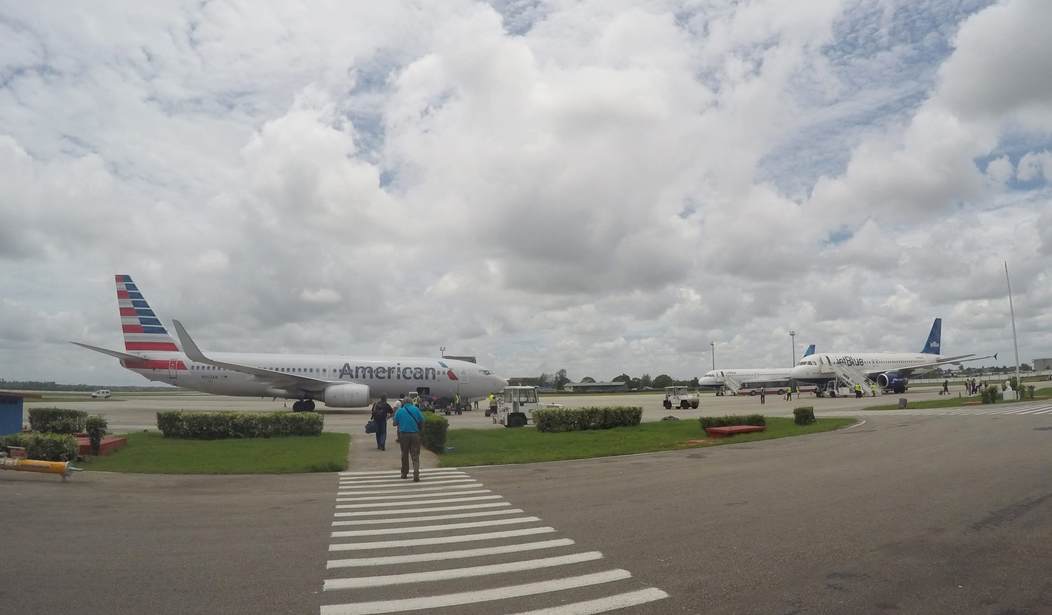WASHINGTON — Two Cuban-American senators are arguing that the administration is playing with fire by trusting the Castro regime to screen airlines coming into the United States under relaxed travel rules.
Sens. Marco Rubio (R-Fla.) and Bob Menendez (D-N.J.) today introduced the Cuban Airport Security Act to block flights from Cuba “until a study has been completed regarding security measures and equipment at Cuba’s airports and certain agreements have been established with the Government of Cuba.”
The legislation requires, among measures such as information on airport personnel vetting and security screening, “an assessment of the ability of known or suspected terrorists to use Cuba as a gateway to entering the United States” and “a mitigation assessment regarding man-portable air defense systems.”
Cuba was until last year on the State Sponsors of Terrorism list. Menendez argued then that the country was removed by the Obama administration despite its regime that “has not shown one iota of change in its actions that earned it a spot on the State Sponsor of Terrorism list.”
The island still provides sanctuary to Joanne Chesimard, who remains on the FBI’s Most Wanted Terrorism List for the murder of New Jersey State Trooper Werner Foerster, and has been supplying arms to North Korea.
Menendez noted today that Cuba “remains a strategic ally of some of the world’s most dangerous terrorist organizations.”
“Since every Cuban airport worker is employed directly by the regime and its airports lack the technology and security capabilities we’ve grown to expect in the United States, I have serious concerns entrusting the Castro regime to protect the lives of Americans flying in and out of Cuba,” the New Jersey senator said in a statement. “This bipartisan legislation would implement the commonsense mechanisms necessary to ensure Cuba is held to the same international airport security standards as other countries, all while preventing a strengthening of the security apparatus that ensures Castro’s tight grip on power at the expense of Americans’ security.”
Rubio called it “irresponsible to leave key aspects of our airport security in the hands of the anti-American, repressive regime in Cuba.”
“President Obama’s legacy should not come before the safety of the American people,” he said. “It’s extremely concerning that airlines operating in Cuba are not allowed to hire their own workers, and airport staff are employees of the Cuban government. This increases the likelihood that someone on the inside seeking to harm the United States could gain access to sensitive flight data and controls.”
Rubio noted he’s opposed commercial flight service to Cuba “because it will only empower and enrich the regime, not the Cuban people,” but “now that President Obama is proceeding unilaterally, we cannot allow our security to be compromised.”
“All commercial flights between the United States and Cuba should be put on hold until we can close these sprawling loopholes, conduct a full audit to make sure personnel is being properly vetted, and verify these flights to and from airports in Cuba include the type of robust security measures needed to keep Americans safe,” the Florida senator said.
Direct service to the United States is offered from 10 Cuban airports, according to a July House hearing.
Chairman of the House Homeland Security Transportation Security Subcommittee John Kotko (R-N.Y.), who tried to visit Cuba earlier this year to inspect airport safety but was denied a visa by the regime, introduced the legislation in the House before the summer recess.
Kotko said today that the Obama administration’s “rush to open regularly scheduled commercial air service between the United States and Cuba without taking proper precautions is negligent.”
American Airlines began regular service to Cuba today with the first flights departing Miami for Cienfuegos and Holguin. Scheduled service from Miami to Camaguey and Santa Clara will begin Friday, and from Miami to Varadero on Sept. 11, according to the airline.









Join the conversation as a VIP Member